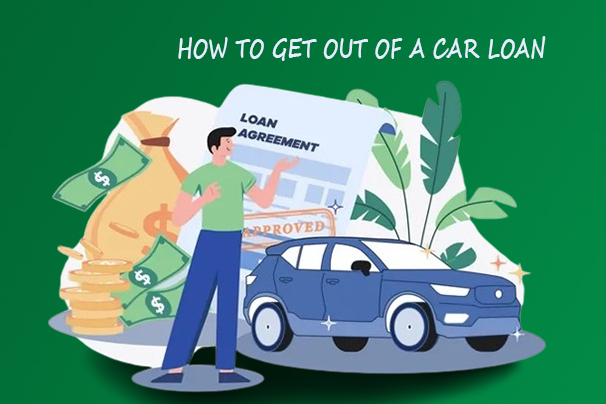Understanding the process of getting out of a car loan is essential when entering a financial contract. A car loan serves as a helpful resource for securing a new or used car when paying the full amount upfront isn’t feasible. The day you purchase a new car marks a significant moment as you navigate the dealership and financing struggles to bring your new vehicle home.

However, if you find yourself needing to find methods to get out of a car loan, you might experience feelings of disappointment. Furthermore, if your financial circumstances alter, maintaining the monthly car payment may become unmanageable.
How to Get Out of a Car Loan
If you intend to take out a loan or have already found one and need to change, this article offers assistance on how to get out of a car loan. Also, we have gathered several options to potentially amend the agreement’s terms or get out of the car loan entirely.
Renegotiate the Loan
As a borrower, you can contact your lender to negotiate a recent payment policy. This approach is beneficial if you possess good credit and payment records and require temporary help to cover sudden events.
However, it’s crucial to note that lenders aren’t allowed to renegotiate terms. Moreover, they might choose renegotiation to bypass the need for loan collection or repossession measures.
Before scheduling a meeting with your lender, carefully assess your finances. Also, calculate the monthly payment you can really stick to for the remaining period of your loan.
Sell the Car
Another approach involves selling the car with a lien. Since you don’t fully possess the car, obtaining permission from your lender is necessary. Moreover, reach out to your lender, express your intention to sell the car, and inquire about the transfer process and necessary paperwork.
Additionally, trading your car at a dealership is the same as selling, but it might be easier than conducting a private sale. However, keep in mind that you may not receive as much for your vehicle from a dealer.
Also, you can sell the car to a friend or family member, provided the lender grants approval. Lastly, it’s important to note that you remain responsible for any outstanding balance on the car loan even after the sale.
Voluntary Repossession
You should surrender your car to your lender only as a last resort. To potentially ease the process, inquire whether voluntarily surrendering the car will clear your loan responsibility.
By surrendering your car voluntarily, you relieve your lender of the expense and inconvenience of repossession, leading to a more favorable final pay-off arrangement. Moreover, it could relieve you of certain concluding expenses, such as late or prepayment fees or fees linked to the vehicle’s resale.
However, it’s important to recognize that this outcome will negatively affect your credit score and may complicate future auto financing endeavors. Just like a standard repossession, a voluntary repossession remains on your credit report for up to seven years.
Refinance your Loan
Refinancing your loan provides discounts to borrowers on a monthly basis, with an extended repayment term, or at the same time. Additionally, a minimal interest rate can lead to lower monthly payments and decreased overall interest expenses.
However, securing refinancing may prove challenging if you are already behind on payments or have less-than-ideal credit. Also, extending repayment terms can lower your monthly installments but may result in higher overall interest costs.
Refinancing becomes a favorable option if you have a good credit score. A higher credit score enhances your chances of qualifying for minimal interest rates and more favorable terms.
Lastly, it’s crucial to remain vigilant regarding any associated fees. One common fee to observe is a pre-repayment penalty, levied for paying off the loan ahead of schedule.
Pay off the Car Loan
If meeting your monthly payments becomes challenging, paying off your loan fully may seem out of reach. However, if you have the financial backup to cover it, it offers relief from the stress of significant debt accumulation.
Additionally, one approach to paying off your loan is through a single large payment. Before proceeding, ensure to verify the exact amount owed with your lender, which typically includes the loan balance and accrued interest fees.
Also, a less intimidating alternative involves an increase in your monthly payments, resulting in an early payoff. While this method results in less overall interest, it may be impossible if you’re already struggling to meet your current car payments.
How to Avoid a Car Loan You Can’t Afford
Take educational steps to help you prevent securing a bad car loan you cannot afford. Before meeting your lender, obtain preapproval for a loan with a solid offer and a clear understanding of your loan terms before buying a car.
Additionally, you can make use of a car loan calculator to review loan expenses and evaluate the impact of adjusting term lengths and down payments. Lastly, you can make a significant down payment to enhance affordability and prevent being in a tough situation.
Conclusion
You can get out of your car loan through various approaches, such as refinancing to improved terms, selling the car, or voluntarily surrendering it to your lender. Regardless of your chosen method, it’s important to take action before it’s too late to make payments and risk defaulting on the loan.
